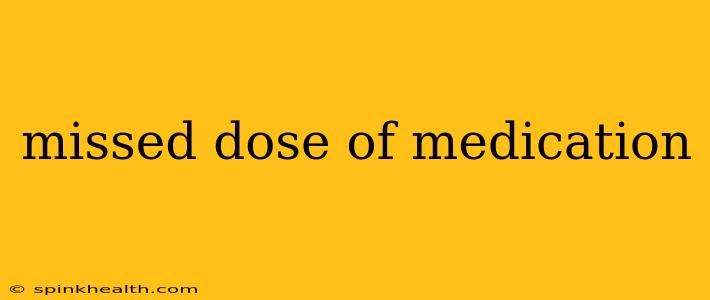Life gets busy. We're juggling work, family, social commitments, and everything in between. It's easy to forget things, and sometimes, that forgotten thing is a vital dose of medication. Missing a dose can be unsettling, but understanding what to do can ease your anxiety and help ensure your health remains on track. This guide walks you through the common questions and concerns surrounding missed medication doses.
What Happens If I Miss a Dose of My Medication?
This depends entirely on the type of medication. Some medications are time-sensitive, requiring consistent levels in your bloodstream to be effective. Others are less critical with regards to timing. For instance, missing a dose of a blood pressure medication could have more significant consequences than missing a dose of an antibiotic. Never assume the impact of a missed dose; always check with your doctor or pharmacist. They can provide specific guidance based on your prescription.
What Should I Do If I Miss a Dose of My Medication?
The first step is to check the label of your medication. Some medications specifically instruct you on what to do if you miss a dose. Generally, the advice falls into one of these categories:
- Take it as soon as you remember: If it's close to the next scheduled dose, you might be advised to skip the missed dose and take the next one at the regular time. This is common for many medications.
- Take it immediately, then resume your regular schedule: This is more common for medications where a consistent level in the bloodstream is crucial.
- Contact your doctor or pharmacist: This is the best course of action if you're unsure what to do or if the medication is particularly sensitive to missed doses.
Remember, don't double up on doses unless explicitly instructed to do so by your doctor or pharmacist. Taking more than the prescribed amount can lead to dangerous side effects.
How Often Can I Miss a Dose of My Medication Before it Becomes a Problem?
There's no universal answer to this. Regularly missing doses, even if only occasionally, can reduce the effectiveness of your medication and impact your health. The frequency at which missed doses become problematic varies drastically depending on the medication and your individual health condition. Consistency is key with medication; if you find yourself frequently missing doses, talk to your doctor. They may be able to adjust your treatment plan or provide strategies to help you remember to take your medication.
What If I Miss Several Doses of My Medication?
Missing several doses can have serious consequences, depending on the medication. It's vital to contact your doctor or pharmacist immediately if you've missed multiple doses. They can assess the situation and provide advice on how to proceed safely. Delaying this crucial step could negatively impact your health.
Can I Use a Pill Organizer to Help Me Remember My Medications?
Absolutely! Pill organizers are excellent tools for managing medication schedules. They come in various forms, from simple weekly pill boxes to sophisticated electronic reminders. Using a pill organizer can significantly reduce the chances of forgetting doses.
Is it Okay to Miss a Dose of Medication Occasionally?
While occasional missed doses might not always have severe consequences, it's essential to strive for consistency. Frequent missed doses will negatively affect the efficacy of your medication and could have harmful consequences.
What Are the Risks of Missing Medication Doses?
The risks vary significantly depending on the type of medication. However, in general, risks can include:
- Reduced effectiveness of the medication: This could lead to a worsening of your condition.
- Increased risk of side effects: In some cases, inconsistent medication use can actually increase the chance of experiencing side effects.
- Potential for serious health consequences: Depending on the medication, missing doses could have severe, and potentially life-threatening, repercussions.
This information is for general knowledge and does not constitute medical advice. Always consult your doctor or pharmacist for personalized guidance on your specific medications. Your health is paramount; don't hesitate to seek professional help if you're struggling to manage your medication regimen.

